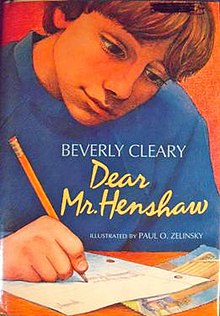Dear Mr. Henshaw
 First edition | |
| Author | Beverly Cleary |
|---|---|
| Illustrator | Paul O. Zelinsky |
| Country | United States |
| Language | English |
| Genre | Young adult |
| Publisher | William Morrow |
Publication date | August 1983 |
| Media type | Print (Hardback & Paperback) |
| Pages | 144 pp |
| ISBN | 0-688-02405-X |
| OCLC | 9371228 |
| LC Class | PZ7.C5792 De 1983 |
| Followed by | Strider |
Dear Mr. Henshaw is a juvenile epistolary novel by Beverly Cleary and illustrator Paul O. Zelinsky that was awarded the Newbery Medal in 1984.[1] Based on a 2007 online poll, the National Education Association named the book one of its "Teachers' Top 100 Books for Children."[2]
Plot summary
Every school year, Leigh Botts writes a letter to his favorite author, Boyd Henshaw. In the 6th grade, Leigh's class has an assignment to write letters to their favorite authors. Leigh includes all the questions he was given as a numbered list. Mr. Henshaw writes back, teases Leigh for not doing research, and includes more questions for the boy to answer. Leigh is angry and first refuses to answer. But when Leigh's mother finds out, she demands he show Mr. Henshaw the courtesy of a reply.
Through his answers to Mr. Henshaw, Leigh's concerns and conflicts are revealed. He struggles with his parents' divorce, being the new kid in school, his relationship with a neglectful father, and a school lunch thief. In a later letter, Mr. Henshaw encourages him to keep a diary of his thoughts and feelings. Leigh is reconciled to the writer, and his new diary is at first written to a Mr. Pretend Henshaw.
Through writing this diary, Leigh learns to accept the parts of his life he cannot change. He must deal with problems that many other children also have to cope with, such as feeling lonely because he is new in town and completing school assignments. His parents will never remarry, he can never fully depend on his father, and he must find adult ways to deal with "bad things," such as not finding the person who still steals his lunch.
Leigh decides to write for the Young Writers club. When he is unable to turn out a story or poem for a school writing contest, he writes a memory of when he and his father hauled grapes to a factory. This earns him an honorable mention in the school yearbook. When one of the contestants turns out to have cheated, Leigh earns his place for lunch with a famous author. Even though the author is not Mr. Henshaw, she compliments Leigh's story.
Background
Ms. Cleary said she began the novel "after two little boys who didn't know one another asked me to write about a boy whose parents were divorced. And I had never thought about it, but I said I'd — give it a try." [3]
References
- ^ "Newbery Medal & Honor Books, 1922-present". American Library Association. Retrieved 6 August 2010.
- ^ National Education Association (2007). "Teachers' Top 100 Books for Children". Retrieved August 19, 2012.
- ^ http://www.readingrockets.org/books/interviews/cleary/transcript%7C"Reading Rockets" retrieved 04/05/2018
